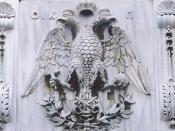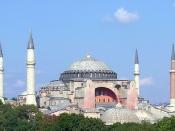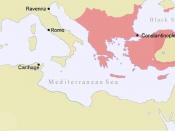The Byzantine Empire considered itself the only true inheritor both of the Roman Empire and of the Christian religion. This fact made the Empire something somewhere between an ally and an enemy to the West. Whether the two were cooperating or fighting, though, events in Byzantium were of great importance to Outremer (especially to Antioch) and to the Crusading movement.
Constantinople was the capital and the greatest city in Christendom in terms of wealth, population, and political power. The Empire it ruled consisted of Asia Minor, the Balkans, and Greece. Over the 12th and 13th centuries, it lost most of its lands in all these areas, but its fortunes waxed and waned dramatically. By 1291, however, the "Empire" was reduced to the city of Constantinople and its hinterland, plus a few outposts.
The Greek Emperor regarded himself as the true inheritor of the Caesars and the true defender of the faith against the Muslims.
The so-called Holy Roman Emperor was nothing but an upstart--at best, he might be considered the western Augustus, recalling the tetrarchy of Diocletian. Similarly, the Patriarch of Constantinople regarded himself as the true head of the Church. The Bishop of Rome (the pope) was the bishop of a great and honorable city, on a par with the Patriarch of Jerusalem or Antioch or Alexandria, but definitely a step below Constantinople and in any case tainted with unorthodoxy.
The Greeks themselves (I shall use the Westerners' term for all those who lived within the Byzantine Empire) generally regarded the Latins with contempt: they were dirty, smelly, violent, treacherous, superstitious, superb warriors but untrustworthy allies. They were greedy and grasping, and were not to be trusted in business matters. For their part, the Westerners had much the same opinion of the Greeks, except they had no respect...


